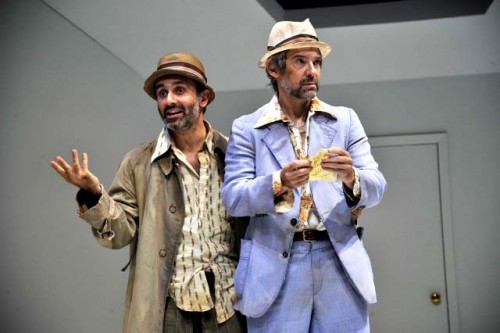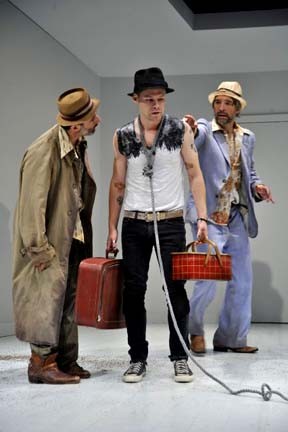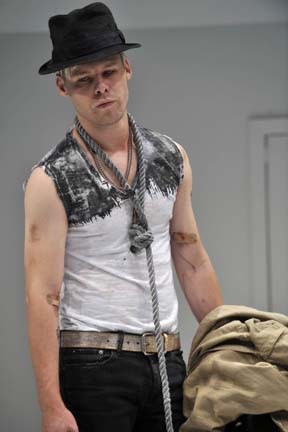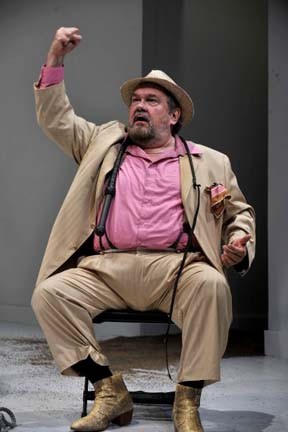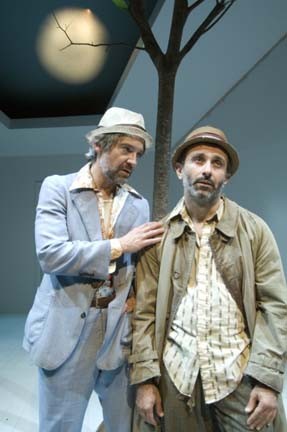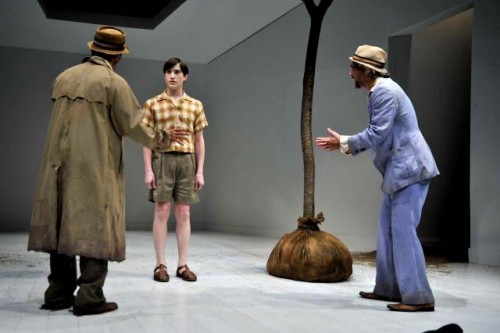Randy Harrison Gets Lucky in Waiting For Godot
Berkshire Theatre Festival Tweaks Samuel Beckett Classic
By: Charles Giuliano - Aug 09, 2008
Waiting for Godot
By Samuel Beckett
Written in French between October 9, 1948 and January 29, 1949. Premiere, Paris, 1953 and with Beckett's staging, 1975, in Berlin. Beckett , born in Dublin, 1906, died 1989. Beckett translated his text into English.
Directed by Anders Cato; Sets, Lee Savage; Costumes, Jennifer Moeller; Lighting, Jeff Davis; Sound, Scott Killian. Cast: Vladamir (David Adkins), Estragon (Stephen DeRosa), Pozzo (David Schramm), Lucky (Randy Harrison).
Berkshire Theatre Festival, Stockbridge, Mass. July 29 through August 23.
http://www.berkshiretheatre.org
"Nothing to be done" Estragon / Gogo (Stephen DeRosa) utters as the first line of the Samuel Beckett play "Waiting for Godot" which is having a radical makeover at the Berkshire Theatre Festival through August 23. That opening line may be taken as a head's up for critics aspiring to say anything new or insightful about the most complex and influential play of the 20th century.
Perhaps, like Anders Cato, the ambitious director of this radical production, we should zig where others have zagged. There is quite a lot of zigging and zagging in this version of the Beckett, avant-garde, theatre of the absurd, standard. We envy anyone seeing this famous play for the first time. Most of us carry as much baggage to the theatre as the unfortunate Lucky (Randy Harrison) schlepping about those objects in the service of his master Pozzo (David Schramm). Like Lucky, we are never allowed to just put down the baggage of our preconceptions and simply look at the BTF production with its provocatively fresh intentionality.
Over the years I have enjoyed several productions including a quite remarkable one at the American Repertory Theatre. In addition, I viewed a video of Godot annually with my former Avant-garde class at Boston University. Just for some relief we alternated viewing Godot in class with "Endgame" and "Krapp's Last Tape." We have taken every opportunity to see any available Beckett performance and at times I have channeled his theatrical persona.
From the first moments of this production, as Bette Davis warned us, "Fasten your seat belts its going to be a bumpy evening." Bounding onto the stage with a pratfall Gogo recovered and sauntered about making provocative eye contact with members of the audience accented with erotic kisses. Later, Gogo and Didi/ Vladimir (David Adkins) would reprieve this strategy by spotting women in the audience and making sign language that conveyed 'What's your number? I'll call you later." This was intended to break down the natural barrier between the performers and audience. It also encouraged us to wonder just who, and what, are these characters? Are they tramps and clowns in the Chaplin/ Keaton/ Laurel and Hardy tradition that inspired Beckett? Are they just a couple of homeless chaps scrounging for the occasional carrot or a chicken bone left over from the rotund Pozzo's lunch?
This layering of illusion and reality is nothing new in theatre and is rooted in Pirandello's 1921 masterpiece "Six Characters in Search of an Author." But this was a new interpretation of Beckett as I know the play. All the more remarkable, as the playwright was absolutely precise in how his plays were to be presented. So much so that it has been difficult to obtain permission from his restrictive estate to stage the plays. Beckett productions have been hard to find in recent years which makes this radical makeover all the more remarkable.
But is it entirely fresh and successful? Well, mixed. Sorry folks, but there is that baggage thing.
As I have come to know Didi and Gogo they are somber, vaudevillian, slow witted and melancholy. It is important that the pace convey the suspension of time. There is tedium and ennui in their lives that makes real their comic attempts at suicide on that wretchedly barren tree. Getting the right cadence is absolutely crucial. If played too slowly the play can be deadly and enervating. But here the tempo set by the director Anders Cato is way too fast. In the notes by the Dramaturg, James Leverett, he states that "And let's be honest about the boredom left in its wake: the term papers, the freeze dried lectures on the Theatre of the Absurd and Existentialism, and-face it-the ponderous, portentous productions, various shades of black, obscurely foreign, very slow, for some reason judged to be 'good for us.' "
So, all of that, arguably, this was not. The set by Lee Savage was daring and remarkable. It is as simple as we expect, just that tree and a sense of barren nature, in this case, set at a funneled, slanted perspective. At the end, on the back wall, is a door. When the Boy (Cooper Stanton) arrives at the end of each act to convey a message from Mr. Godot he seems huge framed in the door that he barely fits in. As he walks forward he seems to shrink to a normal height for his age. Quite a nice trick. As is the device of a trapezoid cutout in the slanted ceiling that signifies sky and then the moon of night at the end of each anxious day. But the lighting of Jeff Davis was far too bright and harsh. Perhaps the bright lights were intended to keep us awake. Often a challenge with Beckett. We longed for those "various shades of black" which Leverett implied were anathema for this production.
In the early stages of the play there was a struggle to believe in Didi and Gogo mostly because of their rash and straight reading of the dialogue. There wasn't enough time to absorb the absurdist ennui and poetry of their despair. The comic interludes just didn't jell when Gogo asks for a carrot or needs help taking off and later putting on his shoes. While they were suitably attired in shabby costumes by Jennifer Moeller Didi and Gogo seemed too rested, normal, and well fed for Beckett's down at the heels, suicidal, vagabonds. The dialogue states that they have been wandering around with lapses of memory where one day blurs into another for some fifty years. In this play time is of the essence.
While the play was threatening to slip into the soporific everything changed with the appearance of the enormous Pozzo and his slave/ masochistic servant, Lucky. The enormity of David Schramm's Pozzo dominated the stage on every level. He was a Pozzo to end all Pozzos.
Similarly, Randy Harrison made us entirely rethink Lucky. The norm is to cast Lucky as thin, older, fragile and bearded. In this version Lucky is a tough young punk. His bare arms reveal bruises (perhaps real on close inspection) and an array of tattoos. Again we wondered if they are real or made up. Over the kicker of his inner elbow was a large band aid implying that Lucky shoots scag when not toting that baggage. There were further provocative and puzzling elements like a word spelled out on the knuckles of one hand and chipped, black finger polish. When his hat was knocked off it was revealed that Lucky had a mop of bleached blond hair. Was this Lucky as rough trade? Are he and Pozzo into something kinky? Which, of course, is exactly what scholars and critics have long speculated. Is Pozzo indeed the Mr. Godot on whom Didi and Gogo put their hopes for salvation?
"Think, pig" Pozzo demands responding to the requests of Didi and Gogo. Dropping the luggage Harrison lurched, gyrated and sputtered through the most difficult and challenging monologue of modern theatre. It was riveting, as was his response to "Dance, pig." The audience was stunned evoking spontaneous applause as Harrison collapsed on the stage. That remarkable performance will rewrite theatre history. It demonstrated that Harrison is evolving as a major actor of his generation. He lived up to all of the expectations evoked by a preview interview with BFA writer, Larry Murray.
So, who is this Mr. Godot whom Didi and Gogo are so anxious to meet? I will spare you further speculation. For that there are libraries , Amazon.com and the internet. That is not for moi to say. Rather we are here to talk about an ambitious, provocative production of a truly great masterpiece of the avant-garde. It is absurd to state that actually the evening went by far too quickly. I really like to brood through one of those dark, moody, foreign Godots which Leverett ridicules. This Godot was, well, way too American. In a lot of ways, however, simply fabulous.

